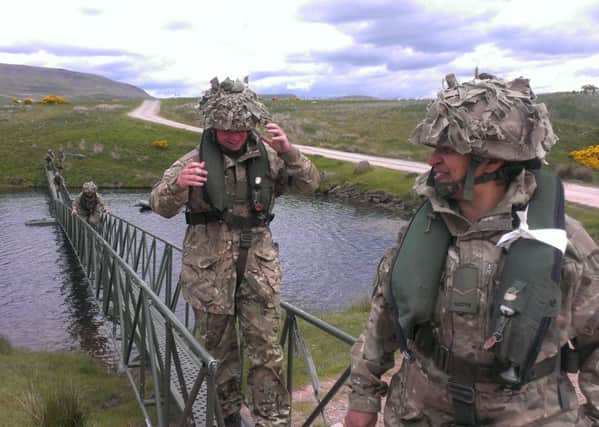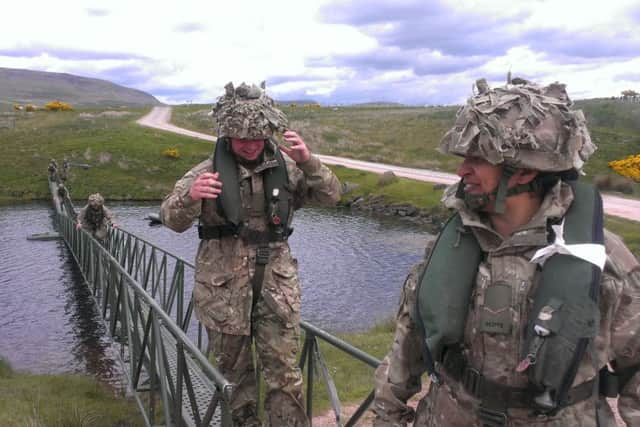Citizen Soldiers of the 7Scots Slideshow


More than 80 members of 51st Highland, 7th Battalion, The Royal Regiment of Scotland (7SCOTS), turned out for their annual two week training camp, which this year was held in Warcop, Cumbria.
7SCOTS draws its strength from across the north of Scotland, with recruits from Angus, Dundee, Aberdeen and Kirkcaldy right through to Stornoway, Elgin and Inverness.
Advertisement
Hide AdAdvertisement
Hide AdAlthough not as glamorous as some of the previous training destinations – last year 7SCOTS was in Fuerteventura practising light infantry skills – the facilities at Warcop were perfect for allowing the battalion to concentrate on getting back to basics.


Commanding officer of 7SCOTS, Lt. Col. Piers Strudwick, explained: “This year has been very much focusing on basic skills and drills such as battlefield communicating or signalling, looking at our Javelin anti-tank missile system and assault pioneer skills. We’ve also been refreshing our medical competencies.
“Everyone enjoys the challenge and the different opportunities, the ability to go and meet up with folk with similar outlooks but from different towns.
“They enjoy meeting with other international armies. We’ve got an American officer with us at the moment which is great.
Advertisement
Hide AdAdvertisement
Hide Ad“Last year we were in Spain and they loved expanding their horizons and experiencing different things.”
I was given a guided tour of the 7SCOTS in action, the first port of call being with the boys of B Company who had been working with the FGM-148 Javelin, an anti-tank missile system.
As Javelin systems can cost up to £250,000 and live missiles tens of thousands of pounds apiece, the men, mostly from the Aberdeen area, use a sophisticated computer trainer linked to a Javelin which allows them to simulate any number of combat scenarios.
They kindly ran me through the basics and, after two shots, I was able to destroy an ‘enemy’ tank, proving that you don’t need to be a rocket scientist in the modern army!
Advertisement
Hide AdAdvertisement
Hide AdIn fact, the idea that the British Army Reserve is a professional, modern fighting force made up of ordinary people was reinforced after just a few minutes of conversation with B Company.
It is manned by students, a hotel manager, a groundsman supervisor and a logistics manager for an oil company.
What brings the men together though is the opportunities offered by the Reserves which, apart from the obvious financial benefits, include real transferable skills that can be mapped across to civilian life – from sports qualifications to language courses.
“It’s just miles better than any other sort of hobby, it’s just so different,” said Private Mark O’Rourke (28).
Advertisement
Hide AdAdvertisement
Hide Ad“The training is good and the people are brilliant. I even got my driving licence through the Army.”
Warrant Officer Second Class John Sinclair (47), a logistics manager, added: “I would say the camaraderie is part of it.
“Another massive part of it is training alongside like-minded people.
“We are paired with 3SCOTS [The Black Watch] and we all have a part to play within the whole Regiment of Scotland. Long gone are the days of Dad’s Army.”
Advertisement
Hide AdAdvertisement
Hide AdElsewhere, another group were learning all about battlefield communications under the watchful gaze of Captain Ian Bunce.
For him the emphasis was on moulding problem solvers; one of their exercises involved turning a simple farm fence into a communications array.
Capt. Bunce said: “It shows in the fact that these guys can think for themselves.
“They can work without supervision, have more confidence in their decision making and can take ownership of a problem and see it through to a successful conclusion.
Advertisement
Hide AdAdvertisement
Hide Ad“They’ll develop a good sense of humour in dealing with the unexpected and undertake complex problem solving in situations that wouldn’t lend themselves to being successful.”
It costs more than £8000 per year to train each Reservist.
“A lot of individuals are working towards something that is beneficial for them,” added Lt. Col. Strudwick.
“They are looking at how they can take opportunities that are available to the British Army Reserve to enhance themselves, so it’s very much a two way street.”
Johnston and the 7SCOTS were on hand to capture the action and their pictures are featured in our slideshow, created for your viewing pleasure by communities hub deputy editor Julie Currie. Enjoy!